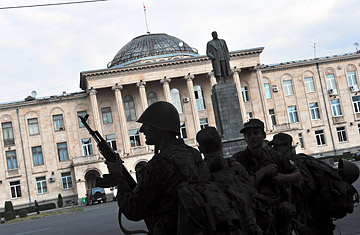
Georgian soldiers walk past a monument of Josef Stalin before going to the front line in Gori, Georgia.
The city of Gori has been getting a lot of attention lately, as the target of Russian air attacks that followed the outbreak of fighting in South Ossetia. But that's not the central Georgian city's only claim to fame. Gori is home to perhaps the world's only museum officially dedicated to the memory of Soviet dictator Josef Stalin, who was born there in 1878, and named Iosif Vissarionovich Dzhugashvili. And, curiously enough, it turns out that many residents of Gori, have a soft spot for the dictator. His epic crimes and Russia's recent attack on their homeland notwithstanding, Stalin remains is the local boy who made good. And the townsfolk of Gori are hoping that the memorial will be spared because of Russian respect for the former strongman, which appears to be on the rise.
The J. Stalin State Museum is an imposing white stone structure with hints of Italian gothic as well as Stalinist monumentalism, built on the dictator's orders back in the early 1950s around the small wooden house where he was born. It's treasures include one of Stalin's trademark woolen capes; a pair of leather riding boots; a pipe; one of just 12 death masks of the leader; letters he wrote in his native Georgian language; and an edition of the works of Immanuel Kant inscribed by the author. The museum also houses the 1930s-era armor-plated Pullman railway carriage that carried the Soviet dictator to famous the historic World War II summits at Yalta and Tehran.
Robert Maglakelidze is the amiable, round-faced director of the museum. He was in his office this week not long after the bombing started . "I heard several airplanes roaring overhead," he told TIME through an interpreter at a Tbilisi café." There was a big flash and a terrible noise. We thought the whole building was falling down. " The percussion and fragments from what human rights monitors confirm as a cluster bomb blew out the windows but the building stood. Maglakelidze says he was anxious to stay on to do what he could to protect the museum, but two days later, when looters descended on the town , he decided to pack up the most prized exhibits — including the Kant letter and death mask, and drive them through the roadblocks ringing the city to the safety of the capital 50 miles away.
As soon as the prized objects had been stored in a "secret location that cannot be revealed," Maglakelidze repeatedly tried and failed to cross the Russian lines to get back to his museum and make sure it was intact. From the outskirts of Gori I spoke to him by phone earlier in the day and pointed out, to his evident frustration, that with Russian tanks blockading the town the time wasn't yet right. He told me he hoped that the Russian troops will protect the landmark, out of respect for the leader who is undergoing a small revival in public opinion in both Georgia and Russia. Throughout his conversation with TIME, he nervously checked his text messages for news of the musuem from a neighbor who had stayed on. The phone tinged. "It's okay," he said, with a sigh. "So far it's okay."
According to Maglakelidze, the museum's visitors include as many foreigners as local Georgians, many of whom are less critical of Stalin than Westerners. "The people in Gori they like Stalin a lot, " he explained. (The town is also home to the world's biggest Stalin statue, standing an impressive 30 feet tall.) "To me, he was a rare phenomenon. How else could someone born in such a tiny place grow up to become the leader of a great nation? He was a great strategist and a tactician, as we saw with the defeat of Hitler. And he was an astute psychologist: he always knew what people were going to say before they said it. I respect him as a phenomenon."
And what about Stalin the monster, who sent millions to die in work camps across the Soviet Union?
"Stalin had a lot of enemies," Maglakelidze answered. "He was blamed for all the crimes of the Soviet government at the time." Besides, said the Georgian, "He was a Christian, and Christians do not do such great crimes if it is not in the interest of their country... You had to live in that time to be aware of the truth. It is like today in Russia. Things are not always what they seem."